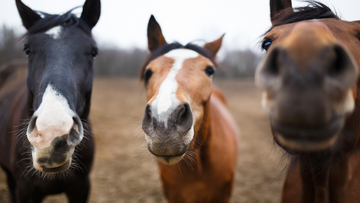Digestive Processes and Nutrient Absorption
The digestive process of a horse begins with chewing. The teeth mash the food and mix it with saliva, making it easier to swallow and digest.
Digestion starts in the mouth because a horse’s saliva contains enzymes that initiate the process. Once the food reaches the stomach, natural digestion begins. Gastric juices containing enzymes help break down the food into smaller particles.
As the food passes through the small intestine, the body absorbs as many nutrients as possible. Enzymes from the pancreas and bile from the liver continue breaking down the food throughout the small intestine.
Finally, the final steps of digestion take place in the large intestine. Here, fermentation occurs to break down the remaining food completely.
Essential Nutrients for Horses
Carbohydrates and Energy Sources
Carbohydrates are the primary energy source for all living beings. Horses consume carbohydrates through hay, grains, and forage. Simple carbohydrates provide immediate and short-term energy, while complex carbohydrates offer long-lasting and steady energy.
Proteins and Amino Acids
Proteins are vital for active horses as they aid in muscle repair after exercise. Horses often receive proteins and amino acids from soybean meal, pulses, and alfalfa hay.
Young horses have higher protein needs to support their rapid growth.
Fats and Fatty Acids
Fats are another energy source that aids endurance, coat health, skin health, and brain function. Fats are found in vegetable oils, fish oils, and flaxseed. Including fats in the diet can improve coat shine and support endurance during activity.
Vitamins
Vitamins are classified as either water-soluble or fat-soluble. Horses can obtain vitamins most easily through fresh forage. When necessary, owners should add supplements to balance out deficiencies in the diet.
Minerals
Minerals are often added to the diet through supplements. They are essential in for nerve function, bone development, and immune support.
Water
Water is necessary for life. Proper hydration helps with digestion and nutrient absorption and allows a horse to regulate its body temperature.
Water needs increase after exercise or in hot weather. Owners must have water available at all times.
Forage: The Foundation of a Horse's Diet
Forage is the most essential aspect of a horse’s diet. Wild horses obtain almost all their nutritional needs from forage.
Grass and Hay Varieties
Despite their large size, horses get most of their caloric needs from grass and hay. The most common grasses to feed your horse are:
- Timothy
- Orchard
- Bermuda
Each of these grasses offers a unique nutrient profile, making them excellent choices for your horse.
Besides grass, horses also rely on hay. Horses need fresh, green hay to receive the most nutrients. Old, brown, and moldy hay can be very bad for your horse. Most often, owners choose alfalfa or clover hay for optimal nutrition.
Planning a Balanced Equine Diet
As an owner, you can work with a nutritionist or veterinarian to plan a balanced diet for your horse.
You will need to balance forage quality and quantity. Additionally, supplements and grains need to be balanced. Vitamins and minerals can be added to the diet to ensure you have the healthiest possible horse.






















